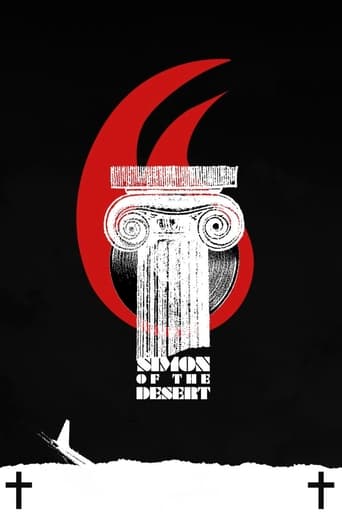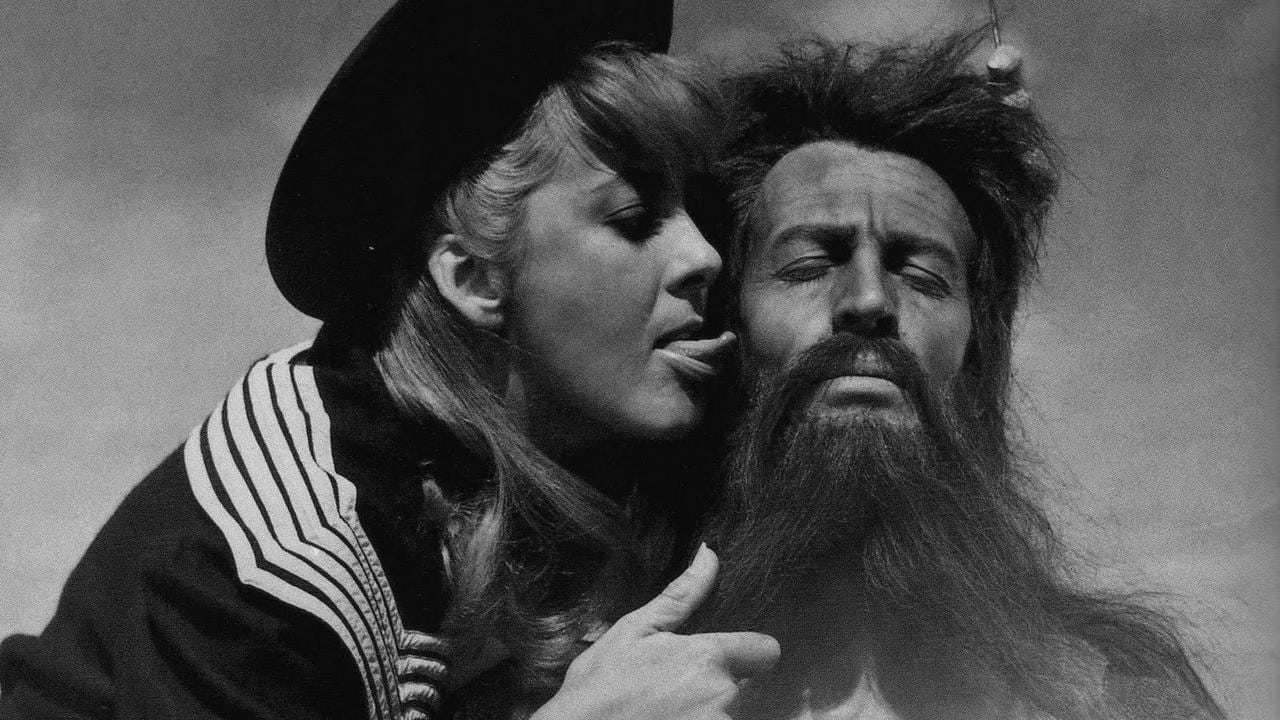Horst in Translation (filmreviews@web.de)
This is a 43-minute black-and white short film written and directed by Luis Buñuel in his 60s at this point already. It is about a very religious and humble almost prophet-like man who looks apparently a lot older than he actually is because of his long beard and also than the actor who plays him.. When we see him transformed near the end, he looks entirely different and much younger. Anyway, we witness this man's (Claudio Brook's) interactions with all kinds pf people, including the devil in the human form of a blonde woman who exposes herself repeatedly in order to lure the man into sin. Brook was a fairly prolific actor and this can also be said about several of the other actors in here, even if they are probably completely unknown outside the Spanish-speaking parts of America. Oh yeah, with regard to that, you will also need subtitles to understand what's going on if you are not fluent in the language. Finally, I felt that this movie looks even older than from 50 years ago. All in all, I did not enjoy it too much. It had its moments, but all in all I found it underwhelming. Not recommended.
JoeKulik
While many reviewers of Luis Bunuel's Simon Of The Desert (1965) seem hung up on the alleged historical fact that the funding for the film was pulled while it was still in production, I just don't see how such information should impinge on the viewer's appreciation, or the lack of it, of a given film. I feel that Simon Of The Desert should be judged for what is seen on the screen, and nothing else.I viewed the film without knowing anything about its alleged funding problem and I think that it's a cinematic masterpiece in the Surrealist and Absurdist traditions just as it stands.I really didn't pick up on the subtleties of Simon's developing crisis of faith, as did other reviewers, , although I suppose that they are actually there to be seen.Actually, Bunuel had me fooled until the very end. I thought that the film as a whole was a tribute of sorts to the real Saint Simeon, a man who had to divorce himself from the "hypocritical" structure and dogma of the established Church to actually find God. This in itself would've been effectively in line with Bunuel's well known disdain for Roman Catholicism and, perhaps, a cinematic acknowledgment that perhaps Bunuel did believe in God and in a genuine spiritual experience, outside of the "phony" constrictions of the established Church hierarchy and dogma, that is.But that the Devil , in the end, magically transports Simon through time and space from the Syrian desert of the 5th century A.D. to a NYC rock and roll nightclub scene ala the 1960's is a very Absurdist twist and dramatically reveals Bunuel's true attitude not only toward the established Church but also toward supposedly pious saints and "holy men" as well.That the Devil tells Simon in the last scene that he is never going back tells me that the 1960's rock scene is Simon's Hell and his just "reward" for his pious and holy life. After a life of severe austerity and deprivation, Simon's "hell" is to spend the rest of eternity in the ultra-materialistic and ultra-sensual world of modern big city life. In short, Bunuel is telling us that the whole idea of saints and "holy men" is just a lot of BS. The abrupt shift in scenes at the end from Simon of the desert to Simon of the modern rock scene is an effective Absurdist commentary on that seemingly atheistic viewpoint.Possible funding problems aside, I find no problem in the relatively short length of this film. The length of the film is sufficient to allow Bunuel to say what he intended to say, and that's all that matters to me. Perhaps, more materialistically minded viewers, imbued with capitalist values, didn't feel that they got their "money's worth" out of this short film, but quantity is never to be equated with quality, in my view.The old adage is "If you have lemons, then make lemonade". If Bunuel did experience funding problems while making this film, then he surely took that "lemon" and turned it into a very tasty "lemonade". at least in my opinion.
Aditya Gokhale
It is typical of every religion to preach that self-sacrifice is the path to find God. That giving up all the "pleasures" of the world will purify man. Wonder where those teachings came from, but it is quite a common trait, no matter what religion. Embrace asceticism, rid yourself of the so-called "worldly pleasures" or "sins" and achieve your spiritual or religious goals! The ultimate path to salvation is here! The Catholic teachings are no different, and Luis Bunuel has always been highly critical of organized religion. He has dedicated so many of his films as tools to launch razor sharp, scathing attacks on these beliefs or the Church in general.Loosely based on the real life story of the 5th century ascetic Saint Simeon Stylites, who spent 39 years atop a column ,"Simon of the Desert" is no exception. Picture a bearded monk, Simon (Claudio Brook), devoting his life to ascetic ways. He has already spent six years, six weeks and six days atop a pillar in the middle of the desert, praying for spiritual purification. He has gained a good amount of followers; mostly peasants, some priests and other village folk who believe that he has been blessed with special powers. They come to him for help or deliver some food from time to time. He is offered a brand new, taller pillar as a token of their faith and respect for his sacrifice. Simon continues his act of good faith, keeps delivering sermons and can even seemingly perform miracles.....Sounds like a serious, religious, deeply meaningful, preachy biography of a Saint? Not in the Luis Bunuel universe! Trust Bunuel to turn something that sounds very deep and heavy into a darkly humorous, absurd mock-fest that is unrelenting and uncompromising in its ways so much so as to scandalize half the audiences who could be believers! So this whole God-fearing stuff takes a dramatic turn as some of the priests and peasants start getting critical of Simon and think it is all in vain. Simon is taken to be an arrogant man by some, and a few others think he is faking it. Simon himself begins to deem his actions futile on several occasions. What's more...the Devil shows up too, and tries to "tempt" Simon in his many ways by appearing in the form of a beautiful woman (Silvia Pinal) in an attempt to seduce Simon out of his saintly ways! Will Simon yield to the temptation? Bunuel takes only about 45 minutes to drive his point across and does it with his masterful touch. Accompanied by Gabriel Figueroa's beautiful camera-work, Bunuel makes unpredictable transitions from realism to surrealism to hilarious absurdism all in the miniscule time frame that was available to him. Apparently Gustavo Alatriste, the producer could no longer fund the film for some reasons and that is how Bunuel was forced to abruptly end the film (with a bizarre ending that has been criticized in several write-ups, but do not be misled...it does have its place..and its own charm based on the interpretation), while in reality he wished to add more material to the film. Whatever the reasons, the end result is a highly original, savagely funny and one of the most eccentric works of cinema from the twisted mind of Luis Bunuel.Pay especially careful attention to certain scenes in which Simon mutters random religious ramblings on seeing some ordinary creatures like an insect (that has absolutely no idea of what is going on!) and later tries to do the same with an inanimate object but gives up! Or the scene in which Simon performs a miracle and gives a cripple a new pair of hands...and the eventual consequence of it! Or that brutally funny scene in which some of the priests don't seem to know the meaning of a particular Biblical reference. Every scene drips a lot of really clever writing....and there is no question that this is an exemplary work of genius from the great director.Bunuel's pick of actors add to the amazing experience with their superb performances, especially Claudio Brook, Silvia Pinal and the midget Jesus Fernandez."Simon of the Desert" is the kind of film that leaves you wanting more. Another 45 minutes of running time perhaps? Check out this masterpiece...do not waste anymore time.Score: 10/10.
CoolReviewBro
If you hold firm religious convictions and spiritual sentiments you may find this movie offensive and sacrilegious. But if you're open to analyze and interpret a film that is unique, entertaining, surreal, and often times bizarre then watch Luis Buñuel's Simon of the Desert. Indeed, one of the most striking influences in this film is the satanic influence from beginning to end. I don't mean this in the "there are hidden satanic messages embedded in this film that will make you take blood oaths, sacrifice goats, and commit to the life of a fallen angel" but consider that after 6 months, 6 weeks, and 6 days (number of the "satanic beast") Simon leaves his old column and accepts a newer, larger, taller, and more ostentatious column bequeathed by a wealthy townsman who was "inspired" by Simon's spiritual feat. Really think about this moment and the mistake Simon made in accepting the new column.Simon, as an ascetic, continually rejects "earthly pleasures" and material objects like adequate food, water, and rations throughout the film. Additionally, Simon seems to reject Satan's advances and temptations (played by a very attractive she-devil). While this may seem like a portrayal of Simon's spiritual strength throughout the film, know that Simon was ultimately doomed from the start by accepting the larger, newer column. It was 6 months, 6 weeks, and 6 days into his spiritual quest that Simon failed and gave into Satan's temptations by accepting the new column.By accepting the column Simon essentially accepted Satan, which is why he has no say in taking the journey to Hell at the end. Maybe Simon would have been saved if he recognized his folly and repented. However, he didn't, which is why Simon is doomed to Hell (the nightclub) at the end of the film. When Simon tells Satan he wants to go home, she tells him he can't. If you wanna know why, just go back to the beginning of the film when Simon gave into Satan's temptation by accepting the new column. So all in all, Simon should have taken advice from rapper Immortal Technique who suggests that "when the devil wants to dance with you, you better say never because the dance with the devil might last you forever."


 AD
AD
